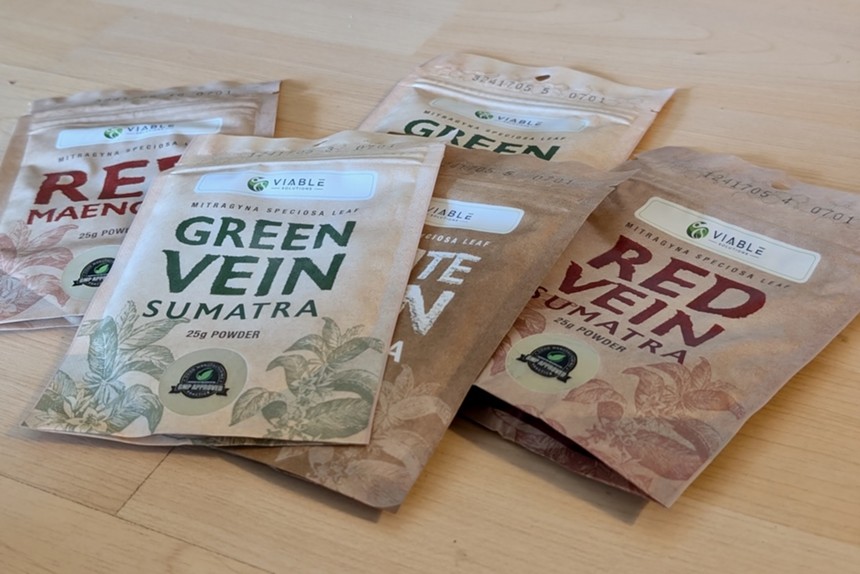He found her in bed — dead. Jennifer Pinney was 32 years old.
Two years later, only bits and pieces of that awful day survive in Logan’s memory. He recalls a police officer coming to the door of the couple’s Gilbert home and holding him as he cried. He remembers sitting in the backyard and feeling “somebody touch my back like (Pinney) would.” No one was there.
Logan and Pinney have been in each other’s lives since they were teenagers, turning an online friendship into a real-life romance. In 2018, they married in a small ceremony at Desert Botanical Gardens in Phoenix. Pinney — “a little 4-foot-11 ball of fireworks,” as Logan described her — walked down the aisle to the delicate piano strokes of “Shrike” by Hozier. Logan called that moment his “personal dust storm.”
But now Pinney was dead, and the explanation for her death has hardly put Logan at peace. An autopsy revealed that Pinney died of mitragynine toxicity. Mitragynine happens to be the main ingredient in kratom, a legal substance Pinney had been using for years to combat her anxiety.
Unregulated by the Food and Drug Administration, kratom can be found in smoke shops in Arizona and across the country and also can be purchased online. Pinney and Logan had researched it together, looking for an alternative to pharmaceutical drugs. Pinney purchased kratom powder from Viable Solutions, an Idaho-based company whose marketing materials showcase the substance in wooden bowls, giving the illusion of an all-natural, healthy product.
For three years, Pinney drank it like tea. One night, it killed her.
That’s according to a wrongful death lawsuit filed by Logan against Viable Solutions on July 26 in Maricopa County Superior Court. Though Logan would not discuss the court case in an interview with Phoenix New Times, his suit accuses the company of misleadingly marketing a “highly addictive and dangerous drug” as a “safe herbal remedy.” As a result, the suit claimed, Pinney became “dependent” on kratom.
Until she died from it.
“That cornerstone in your life, that support mechanism that you kind of always leaned on,” Logan said, “was gone.”

Viable Solutions markets its kratom powders with phrases like "all you’ll need for a relaxing night after a long day,” “floaty and mellow” and “to unwind and ease into a state of tranquility.”
Matt Hennie
Legal and unregulated
Kratom is derived from the leaves of a tree found in Southeast Asia, and in the eyes of multiple federal agencies, the product exists in a legally fuzzy area.The FDA doesn’t regulate kratom. The Drug Enforcement Agency tried to ban it in 2016, but that effort was met with pushback from Congress, including from then-U.S. Rep. Matt Salmon, a Republican from Arizona. While Kratom remains legal in most states, six — Alabama, Arkansas, Indiana, Rhode Island, Wisconsin and Vermont — have banned it.
The FDA has warned consumers not to use kratom, but companies that manufacture and sell the product are given wide latitude in how they market it.
On the “What is Kratom” page of Viable Solution’s website, kratom is described as coming from “a tropical evergreen tree in the coffee family” that has “been used for centuries as an herbal supplement in traditional medicine.” The site also lists several documents and studies, all of which paint a generally positive picture of the drug. Logan’s suit said the company’s kratom products were pitched with phrases such as “all you’ll need for a relaxing night after a long day,” “floaty and mellow” and “to unwind and ease into a state of tranquility.”
Viable Solutions does post a disclaimer about kratom on its website. A “Botanical Facts” image that accompanies each product provides a suggested use section and disclaimer that its products are “not intended to diagnose, treat, cure or prevent any disease or condition.” Deeper within the site, hidden under the 16th tab of its FAQ page, the company acknowledges that “some products may even be toxic” and urges customers to “do your research and consult with your medical professional before buying any of these products.”
The company has not responded to a request for comment.
But the degree of danger kratom presents is difficult to know. Few clinical trials or test have been conducted on humans. The little that is known about the drug's safety or health benefits comes from studies conducted on rats or ones that examined only short periods of human consumption, not long-term use such as Pinney’s.
What's more certain is that a lot of people use it. Because kratom can produce opioid- and stimulant-like effects, according to the National Institute on Drug Abuse, it’s fairly popular. Experts estimate that between 5 million and 20 million Americans use kratom each year. Some use it recreationally, while others turn to it to combat anxiety or depression, for pain management or as a replacement for opioids.
If Pinney had become dependent on kratom, that’s not uncommon, said C. Michael White, a professor of pharmacy practice at the University of Connecticut. According to White, kratom has an addiction potential similar to cannabis or alcohol. About a quarter of kratom users experience addiction, he added.
The drug is not to be taken lightly.
“If you’ve never taken the product before … you may be one of those people who is going to get hooked,” White said. “And for you, it’ll have a very detrimental effect on the rest of your life.”
University of Florida College of Pharmacy professor and kratom expert Christopher McCurdy disagrees slightly. He’s studied kratom for 20 years and said it doesn’t cause addiction as much as it leads to dependence, such as a coffee drinker getting a headache when they forgo a morning cup.
“If they don't have their dose, they do have some irritability and withdrawal effects, which are, for the most part — in the people who are using it responsibly — pretty mild,” McCurdy said, though he has also heard from high-level users that they struggle to decrease their daily usage in any way.
What’s rare — extremely so, according to NIDA — are deaths such as Pinney’s. When they do happen, kratom often isn’t the sole culprit. A 2019 NIDA report found that 11 deaths between 2011 and 2017 in the U.S. were associated with kratom exposure, and only two were associated with kratom alone. “In a lot of those cases, the people had taken several different substances at the same time,” White said. “Was kratom an innocent bystander? Was it a contributor? Or was it the main cause?”
Pinney’s autopsy suggests it was the main cause, but McCurdy warns against relying too heavily on those reports. He’s served as an expert witness on other kratom-death-related lawsuits, many of which he said resulted in settlements. Medical examiners are not trained toxicologists, he said. If they can’t find anything wrong in the autopsy but find an unfamiliar substance such mitragynine, they will label that as the cause of death.
“There have been a couple of autopsy reports that said mitragynine was the cause of death,” McCurdy said, “and, by the way, they had a gunshot wound to the head.”

Cullen Logan (right) said he's been unable to work since the 2022 death of his wife, Jennifer Pinney (left).
Courtesy of Cullen Logan
‘Absolute hell’
Kratom-related deaths may be few, but they do occur. Their rarity hardly mitigates the grief they cause.Since Pinney’s passing nearly two years ago, Logan has been unable to work, according to his lawsuit. He has attended grief therapy and counseling sessions, but larger events would lead to "whole emotional breakdowns and crying” afterward.
He is not the only one affected. Logan also brought the suit on behalf of Pinney’s parents, Elizabeth Pinney and Thomas Gabaldon. Logan also has two sons from a previous relationship who were close with Pinney. “They really loved her and cared about her,” Logan said, and both boys have struggled in school since her death.
For Logan, the last two years have felt like “a time warp” and an “absolute hell” without Pinney. Around the home they shared, her presence persists. Pinney painted, and some of her childhood work still hangs around their house. She’ll never be totally gone, but Logan also will never be totally over losing her.
“You’re constantly asking for answers and questions,” Logan said, “that you’ll never get proper answers to.”
His lawsuit could provide some explanation, though it could take years to resolve. But if it results in even a small amount of justice for Pinney’s death — and there’s no guarantee that it will — it will give Logan a measure of closure he’s craved for a long time.












